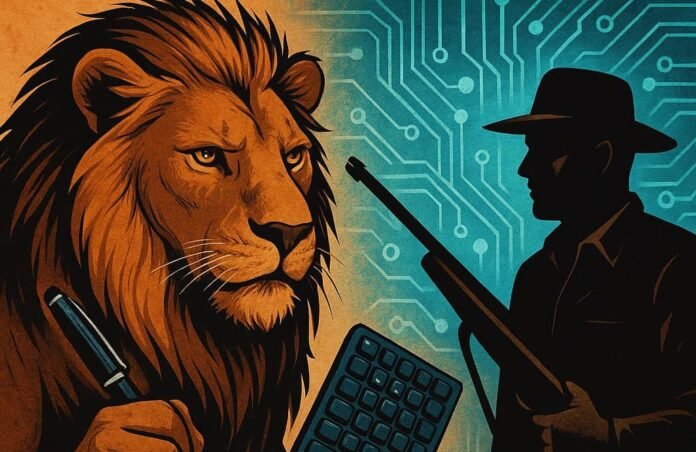By: Isaac Christopher Lubogo (SuiGeneris)
The Proverb and Its Timeless Warning
An old African proverb tells us: “Until the lion learns how to write, every story will glorify the hunter.” It is a proverb about power and narrative, about who holds the pen and therefore who dictates truth. The hunter tells the tale of bravery, conquest, and dominion. The lion’s pain, resistance, and dignity are erased because the lion has no script, no parchment, no alphabet.
This proverb is not merely about hunters and lions. It is about Africa and her colonisers. It is about the tragedy of silence when knowledge is monopolised by another hand.
From Oral Tradition to Colonial Script
Africa was never voiceless. Our ancestors sang history in orature—songs, proverbs, riddles, and drumbeats. The hills and valleys echoed with memory. But then came the colonialist, who had mastered the written word. He codified law, mapped land, named rivers, and drew borders.
In that shift, Africa’s stories were no longer its own. To be “civilised” meant to read and write in alien tongues. Indigenous knowledge became “folklore,” while colonial records became “history.” The hunter’s ink subdued the lion’s roar.
And so Africa was colonised not only by gun and chain, but also by grammar and script.
Neo-Colonialism: The Continuation of the Pen
Independence did not end this narrative captivity. The textbooks still bore the hunter’s ink. Economic policies, international treaties, and even development theories were imported, drafted elsewhere, and imposed here. Africa’s memory was distorted in its own classrooms, where a child could recite the kings of England but not the heroes of Buganda, Benin, or Mali.
This was the neo-colonialism of knowledge—the rewriting of Africa’s story in fonts it did not choose.
The Coming Threat: AI and the Death of African Knowledge
Now, another frontier emerges: artificial intelligence.
AI is not neutral. It is a library, a mirror, and a weapon. It feeds on data—language, stories, histories, and philosophies. But whose data does it consume? Whose truths does it reflect? If Africa does not build its own AI, coded with its own languages, infused with its own wisdom, then the continent faces a new death—the AI death of knowledge.
This is more dangerous than colonial script. For while the hunter’s ink could be contested, AI creates a living archive that shapes thought, education, governance, and even memory itself. An AI built in California or Beijing, without Africa’s voice, will erase Africa more completely than any empire ever did.
The lion will not only fail to tell its story; its very image may be redrawn into extinction.
The Choice Before Africa
Africa stands at a crossroads:
To consume AI—as a user of imported tools, training machines with data that ignores its soul, becoming a silent consumer of another empire’s memory.
Or to create AI—rooted in Luganda, Kiswahili, Zulu, Amharic, Yoruba, and Shona; powered by African ethics of Ubuntu; designed to preserve African medicine, agriculture, law, and philosophy.
If we fail, our children will be educated by machines that know Shakespeare but not Okot p’Bitek, Aristotle but not Nyerere, Einstein but not Cheikh Anta Diop.
If we fail, the African lion will vanish from the digital savannah.
Toward an African AI Renaissance
The hunter has always written. But now, the lion must learn not only to write but also to code.
The new proverb must read: “Until the lion builds its own AI, every future will glorify the hunter.”
Africa must train engineers, invest in data sovereignty, digitise indigenous knowledge, and protect its languages from extinction. For language is not merely communication; it is a worldview. If Luganda dies, a whole universe of meaning dies. If Africa does not teach AI its own tongues, then AI will never think in African ways.
Conclusion
Colonialism silenced Africa with ink. Neo-colonialism muted it with economic policy.
AI, if unchallenged, will erase Africa with code.
But if Africa rises, writes its own AI, and inscribes its own memory into the digital age, then the lion will not only tell its story; it will roar across eternity.
Final Word:
The pen colonised Africa. The keyboard can liberate it.








